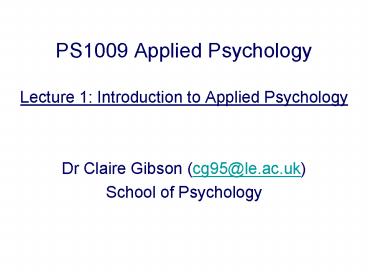PS1009 Applied Psychology Lecture 1: Introduction to Applied Psychology - PowerPoint PPT Presentation
1 / 17
Title:
PS1009 Applied Psychology Lecture 1: Introduction to Applied Psychology
Description:
What is Applied Psychology?' The use of psychological principles/theories to overcome problems ... Applied psychology. focus on practical goals (i.e. doing and ... – PowerPoint PPT presentation
Number of Views:3383
Avg rating:3.0/5.0
Title: PS1009 Applied Psychology Lecture 1: Introduction to Applied Psychology
1
PS1009 Applied PsychologyLecture 1
Introduction to Applied Psychology
- Dr Claire Gibson (cg95_at_le.ac.uk)
- School of Psychology
2
Lecture 1 - Introduction to Applied Psychology
- Overview
- Module content/examination
- What is Applied Psychology?
- History of Applied Psychology
- Skills required for Applied Psychology
- Areas of Applied Psychology
- Career Opportunities in Applied Psychology
3
Module Content Examination
- AIM To provide an insight into how psychology
has been and can be used. - LECTURES Various members of School of Psychology
- Mondays, 16.00 17.00, KE LT1
- Fridays, 13.00 14.00, Att LT1
- Handouts, ppt presentations, module website,
- Exam MCQs
4
What is Applied Psychology?
- The use of psychological principles/theories to
overcome problems - Application of psychological knowledge,
principles and techniques in areas of everyday
life. - Contrasts to academic research
- Academic research
- end-point is understanding
- Applied psychology
- focus on practical goals (i.e. doing and outcomes
rather than knowing)
5
Applied Psychology AND Academic Research
- Applied psychology does draw on academic research
- But, two-way process
- Many of the classic findings of research have
been result of problems in the field of
application - Development of intelligence tests children with
learning difficulties - Attitude change US govt. attempts to boost
morale - Psychoanalytic school founded on the work of
a few doctors (Freud) working with a small number
of psychiatric patients
6
Areas of Applied Psychology
- Major areas in UK are big professional domains
- Clinical Psychology
- Counselling Psychology
- Educational Psychology
- Forensic Psychology
- Health Psychology
- Occupational Psychology
- Covered in detail in subsequent lectures.
- There are many other domains of applied
psychology (consulting, consumer, environmental,
military)
7
What is an Applied Psychologist?
- Overall aim
- to produce some form of change in human
behaviour/experience. - The special role/skills of the applied
psychologist - Use of scientific method
- Membership of a professional body
- Knowledge and theory
- Interventions and their evaluation
- Code of conduct and professional ethics
- Production of practice and research data.
8
1. Use of scientific method
- Make use of the scientific method in approaching
the problem solving - Stages in the traditional scientific method
- Observation
- Induction
- Theory production
- Hypothesis testing
- Data collection and analysis
- Support, rejection or modification of theory
9
2. Membership of a professional body
- British Psychological Society (BPS)
- THE professional and academic reference point for
all UK psychologists - Founded in 1901
- Principal aims
- High standard of professional education and
knowledge - Code of Conduct
- Register of Chartered Psychologists
- Resources for promoting invention and research
- Print, publish and circulate papers, books etc.
10
3. Draw on a body of knowledge and theory
- Body of research knowledge
- Skills of assessment, analysis, evaluation,
hypothesis development and hypothesis testing - skills you will be taught during your degree
course
11
4. Interventions and their evaluation
- Contact with client
- Assessment
- Discussion of the problem
- IS there a problem?
- Data collection/analysis of behaviour
- Diagnosis/formulation
- Previous similar cases
- Generation of hypotheses
- Construction of the intervention programme
- Specific course of action
- Desired/expected outcomes
- Implementation of the intervention programme
- Evaluation
- Has the intervention worked?
- How well did it work?
12
5. Code of conduct and professional ethics
- Consent
- Permission MUST be obtained
- Not necessarily always from patient/participant
- Debriefing
- Must fully explain purpose of any intervention
- Important if deception has occurred
- Withdrawal, confidentiality and protection
- Requires careful consideration
- Advice
- Professional psychologists experts?
- Beware of giving advice
13
6. Production of practice and research data
- Professional psychologists engage in the
application of theory and method - Develop theory
- Contribute important and useful findings to the
knowledge pool
14
Fundamental vs. Applied Research
- Applied
- Tackles specific problems
- Fundamental (Basic)
- Researchers interested in furthering knowledge of
the subject in question
15
What can I do with a degree in Psychology?
- Career Opportunities I
- Prior to the 1940s academic world of research
and teaching - Post-1940s increased demand for the services
of professional applied psychologists
16
What can I do with a degree in Psychology?
- Career Opportunities II
- Major professional domains clinical,
educational, forensic, occupational - ALL require further specialist training
- Postgraduate training doctoral degree (e.g. in
clinical or educational) or a Masters degree
(e.g. in forensic) - Require you to have Graduate Basis for
Registration (GBR) - Obtained via BPS accredited degree, e.g. BSc
(Hons) degree in Psychology, University of
Leicester
17
Further Information
- Reading List (module website)
- Coolican, H. (1996) Applied Psychology. London
Hodder Stoughton. - Main Library, 158 COO































